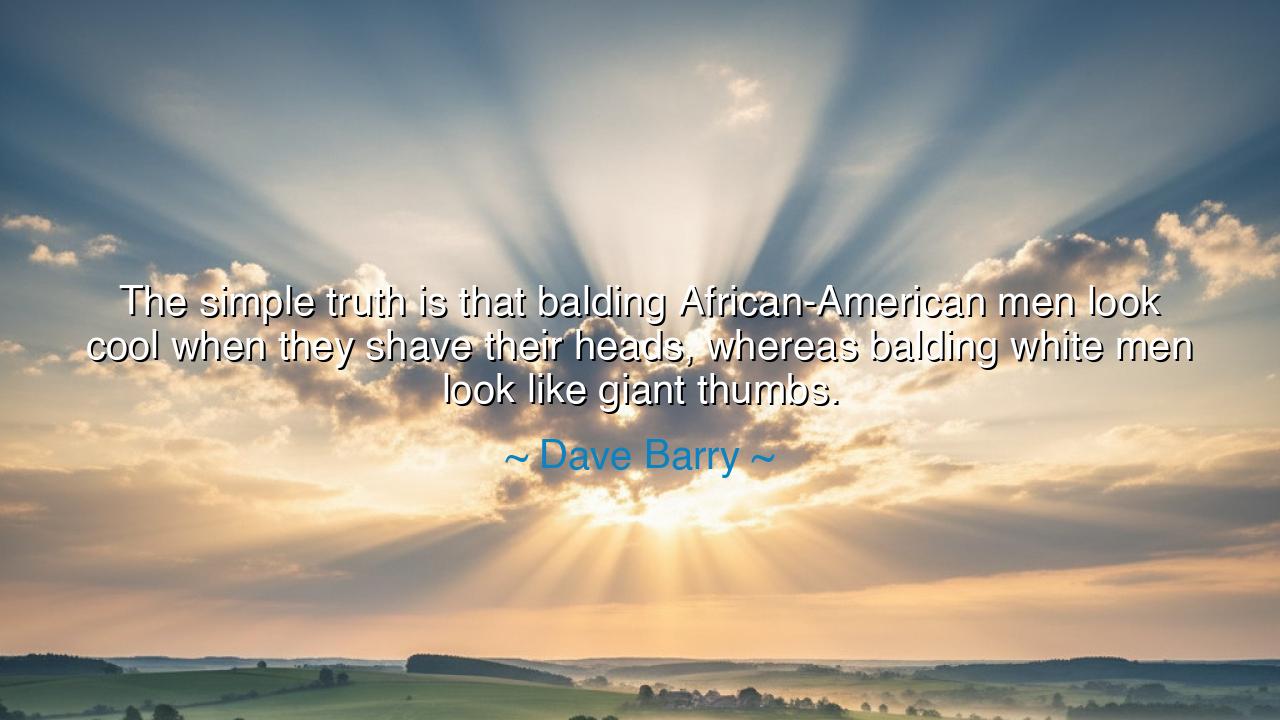
The simple truth is that balding African-American men look cool
The simple truth is that balding African-American men look cool when they shave their heads, whereas balding white men look like giant thumbs.






In the whimsical words of Dave Barry, "The simple truth is that balding African-American men look cool when they shave their heads, whereas balding white men look like giant thumbs." Though humor may seem to lighten the tone of these words, there lies within them a deeper, more poignant reflection on identity, perception, and the ways in which society constructs ideas of beauty and coolness. In essence, Barry is commenting on how appearance, much like the shifting tides of fashion, is subjective and often influenced by cultural context. What is considered "cool" in one community may be perceived differently in another, and this interplay of self-expression and societal expectations offers a rich topic for reflection.
Consider the ancient Greeks, who placed great value on the ideal form—the perfect body, often sculpted in marble to represent their understanding of beauty and virtue. The Greeks believed that physical appearance was an outward manifestation of one’s inner worth. Yet, in the quest for beauty, there was also recognition that true greatness did not lie solely in external qualities but in the pursuit of excellence of mind and spirit. Perception of beauty and dignity was shaped by the values of the time. Similarly, Barry’s statement reflects the way we, as a society, are drawn to certain appearances while disregarding others—often unconsciously elevating certain qualities based on the cultural values of the moment.
Take, for example, the case of the great philosopher Socrates, who famously said, “Beauty is a short-lived tyranny.” Socrates, though not a man of traditional beauty, was revered for his wisdom and his deep understanding of human nature. His power came not from his physical form but from his mind and his unwavering commitment to seeking truth. Yet, in his time, others around him likely regarded him as unattractive or unremarkable. This duality of perception—the clash between outward beauty and inner greatness—is a theme that runs through human history, much like Barry’s humorous comment about balding men. What may be deemed “cool” or “beautiful” to one may be seen as less than desirable by others, depending on the prevailing standards of the time and place.
This tension between external and internal beauty has been explored in many cultures. The ancient Romans, for instance, had an understanding of virtus, which was more about character and moral excellence than appearance. In Roman society, a person of great virtue could be admired regardless of their looks. But the conflict between inner virtues and external appearances remains a prevalent theme in many societies. Barry’s playful remark about balding men illustrates the humorous way in which we attach so much importance to physical features that ultimately have no bearing on one’s character or capabilities.
Even in more modern times, figures like Nelson Mandela or Mahatma Gandhi challenged the world’s views on what constitutes true greatness. Mandela, who spent 27 years in prison, was not admired for his physical appearance, but for his resolve, leadership, and the moral force he exerted on the world. Gandhi, too, with his simple attire and humble demeanor, was a far cry from conventional beauty standards, yet he became a global icon not because of his outward appearance but because of the strength of his character and his commitment to justice. These figures show that what truly defines greatness is not the shape of one’s head, but the depth of one’s character and the impact one has on the world.
Dave Barry’s quote, while humorous, calls us to recognize how much we allow the world of appearance to dictate our perceptions of what is attractive or admirable. It speaks to the subjectivity of beauty and how society places weight on physical features that ultimately have little bearing on a person’s worth. Identity is shaped not by the size of one’s frame or the fullness of one’s hair, but by the actions one takes, the values one lives by, and the strength of character one demonstrates.
The lesson here is profound: we should not be swayed by the surface, but rather focus on what lies beneath—the virtues, intelligence, and courage that define a person’s true beauty. Let us not waste time comparing ourselves to the external expectations of others, but let us seek to cultivate inner strength and self-acceptance, understanding that true beauty comes from embracing who we are, regardless of how others may perceive us. Whether we have a full head of hair or a shaved scalp, it is our integrity, our actions, and our purpose that will truly define us, just as it was with the great leaders and thinkers of the past. Let us embrace who we are, for in the end, our worth is measured not by how we look, but by the depth of our spirit.






AAdministratorAdministrator
Welcome, honored guests. Please leave a comment, we will respond soon